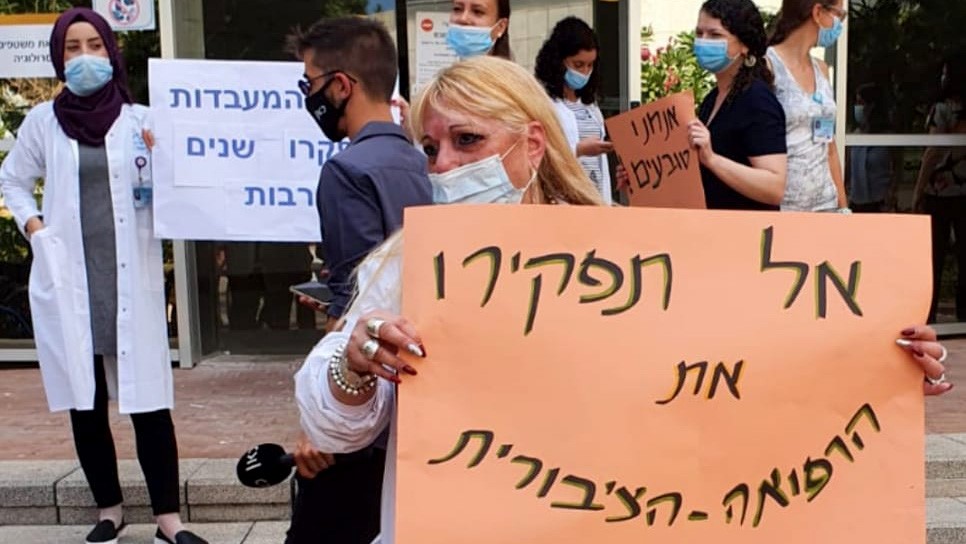Around 2,000 laboratory workers employed at some 400 state-run labs started an open-ended strike on Sunday morning, August 30, amidst a pay dispute with the Treasury. Following reports that the far-right government has begun diverting tests to very expensive private labs, the chairwoman of the Union of Biochemists, Microbiologists and Laboratory Workers, Esther Admon, wrote in a letter to union members that Prime Minister Benjamin Netanyahu, Finance Minister Israel Katz and Defense Minister Benny Gantz are “directly responsible for looting the public coffers and privatizing the public health service.”

Medical lab workers demonstrate at Sheba Hospital, Tel Hashomer, August 11, 2020. The sign in the foreground reads: “Don’t abandon public medical care.” (Photo: Lab Workers Union)
In a statement Sunday evening, the lab workers union said no headway has been made in negotiations and continued to criticize the Finance Ministry. “The strike will continue as long as the government, in a weird and irresponsible way, continues to encourage the crushing of hospital labs and health maintenance organizations, from which workers simply want to flee,” due to poor employment conditions, the statement said. “We have no choice. If we don’t strike now, in two or three months there will be no lab workers left and there will be chaos in Israel,” the statement continued.
Admon stressed that the Finance and Health Ministries have been “playing ping-pong” with the lab workers for over five years. The current strike is the first work stoppage by lab workers since 2018. “One would have expected that the coronavirus crisis would have ended this silly saga and clarify the importance of the stability of the laboratory system, but even the brightest warning lights do not move anyone, from the Prime Minister down through the Finance and Health Ministries,” said Admon.
Admon warned of a crisis involving an exodus of veteran workers, the public system’s inability to recruit young staff and the resulting full privatization of the laboratories in Israel. The hourly wage for the job is less than 40 shekels an hour, for experienced professionals with at least a bachelor’s degree. Admon explains that she met with Yaakov Litzman, former Minister of Health in 2016, after a critical report exposing issues in the system was published. Since then, no plan has been formed to solve this problem, which threatens to close down the labs, nor has Admon heard from representatives of the ministry.
As long as the coronavirus crisis is unfolding, health labor unions are forced to take central roles in its management. Even under normal circumstances unions have no say on policy and professional issues, but in the absence of real leadership, they must be the last line of defense keeping the system from economic starvation and even collapse. The medical doctors currently have two labor disputes open with the government, including complaints of a lack of work force. Last July, to put an end to the nationwide nurses’ strike, the Israeli ministers of health and finance agreed to a temporary addition of 2,000 nurses, and on the establishment of a joint team with the nurses’ representatives to discuss long-term additions.
Related:


